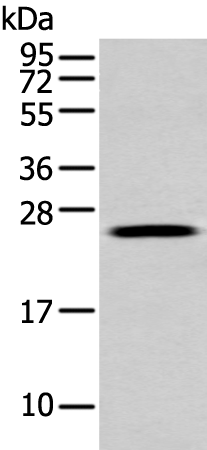
| WB | 咨询技术 | Human,Mouse,Rat |
| IF | 咨询技术 | Human,Mouse,Rat |
| IHC | 咨询技术 | Human,Mouse,Rat |
| ICC | 技术咨询 | Human,Mouse,Rat |
| FCM | 咨询技术 | Human,Mouse,Rat |
| Elisa | 1/5000-1/10000 | Human,Mouse,Rat |
| Aliases | FGFBP; HBP17; FGF-BP; FGF-BP1; FGFBP-1 |
| WB Predicted band size | 26 kDa |
| Host/Isotype | Rabbit IgG |
| Antibody Type | Primary antibody |
| Storage | Store at 4°C short term. Aliquot and store at -20°C long term. Avoid freeze/thaw cycles. |
| Species Reactivity | Human |
| Immunogen | Synthetic peptide of human FGFBP1 |
| Formulation | Purified antibody in PBS with 0.05% sodium azide and 50% glycerol. |
+ +
以下是关于FGFBP1抗体的3篇参考文献示例(内容基于公开研究整理,具体文献请核实数据库):
---
1. **标题**: *FGFBP1 promotes tumor progression in hepatocellular carcinoma via VEGF signaling*
**作者**: Wang Y, et al.
**摘要**: 研究通过FGFBP1抗体检测肝癌组织中蛋白表达水平,发现FGFBP1过表达通过激活VEGF通路促进肿瘤血管生成和转移,提示其作为治疗靶点的潜力。
2. **标题**: *FGFBP1 as a biomarker for aggressive breast cancer subtypes*
**作者**: Smith JL, et al.
**摘要**: 利用FGFBP1抗体进行免疫组化分析,证实FGFBP1在三阴性乳腺癌中高表达,并与患者预后不良相关,表明其可作为临床分层的生物标志物。
3. **标题**: *Functional characterization of FGFBP1 in fibroblast growth factor trafficking*
**作者**: Harris TP, et al.
**摘要**: 研究通过抗体阻断实验揭示FGFBP1在调控FGF家族细胞因子分泌中的作用,阐明其在组织修复和肿瘤微环境中的分子机制。
---
建议通过PubMed或Google Scholar以关键词“FGFBP1 antibody”、“FGFBP1 expression”进一步检索最新文献。
**Background of FGFBP1 Antibody**
The Fibroblast Growth Factor Binding Protein 1 (FGFBP1) is a secreted chaperone protein that binds to fibroblast growth factors (FGFs), modulating their bioavailability and interaction with receptors. Primarily expressed in tissues like the kidney, placenta, and certain tumors, FGFBP1 plays a role in angiogenesis, wound healing, and tumor progression by enhancing FGF-mediated signaling pathways. Dysregulation of FGFBP1 has been implicated in cancers, including squamous cell carcinoma and hepatocellular carcinoma, where it promotes cell proliferation, invasion, and metastasis.
FGFBP1 antibodies are essential tools for studying the protein's expression, localization, and function in both physiological and pathological contexts. These antibodies are widely used in techniques such as Western blotting, immunohistochemistry (IHC), and immunofluorescence (IF) to detect FGFBP1 in tissue samples or cell lines. Researchers also employ FGFBP1 antibodies to investigate its role in tumor microenvironments, stromal interactions, and potential as a biomarker or therapeutic target.
Recent studies highlight FGFBP1's dual role in cancer—acting as either an oncogene or tumor suppressor depending on context—underscoring the need for reliable antibodies to dissect its complex biology. Commercial FGFBP1 antibodies are typically raised in rabbits or mice, targeting specific epitopes of the protein, and are validated for specificity and reproducibility across applications. Their development continues to support advances in understanding FGF signaling and cancer mechanisms.
×